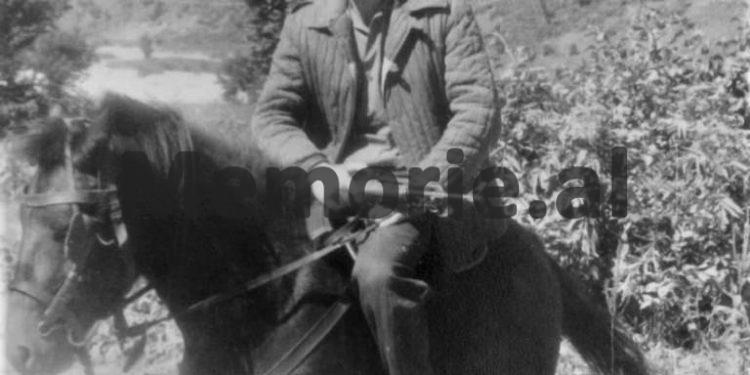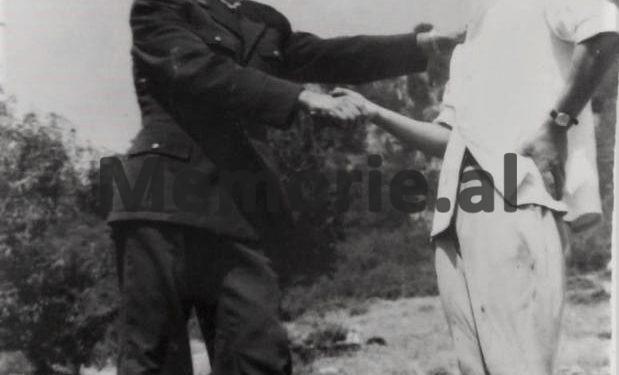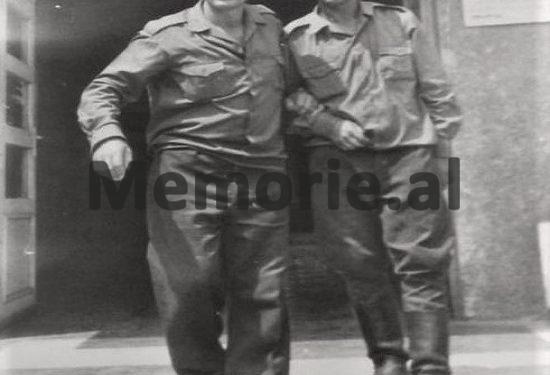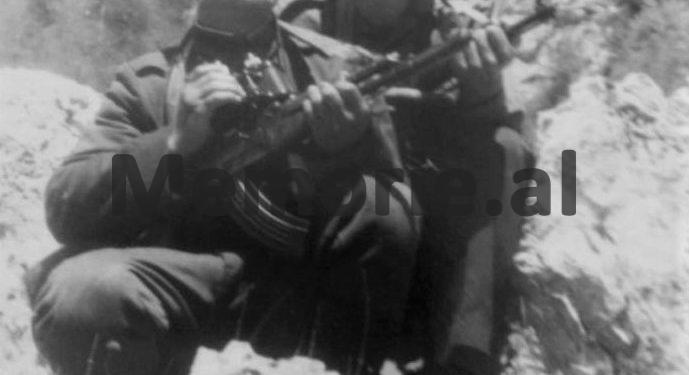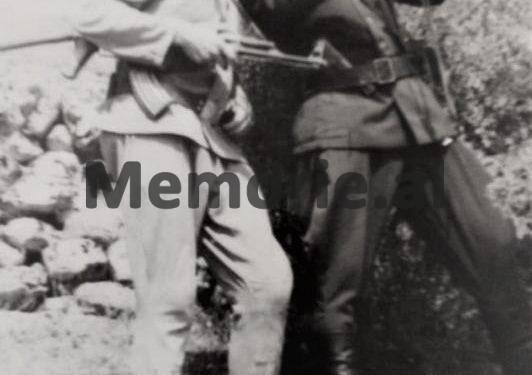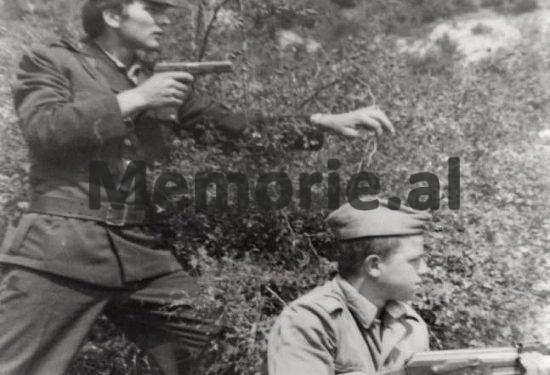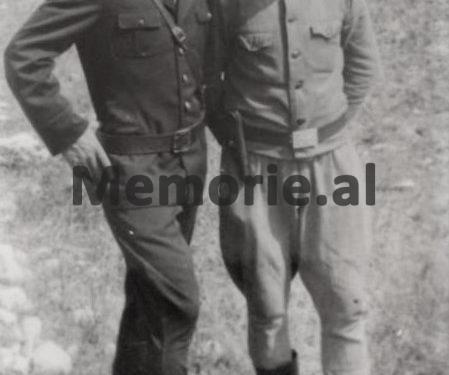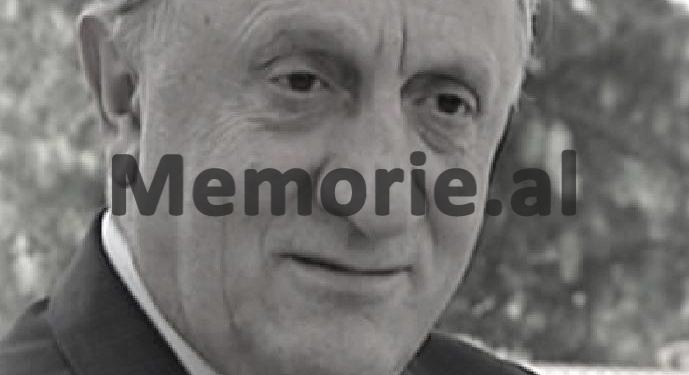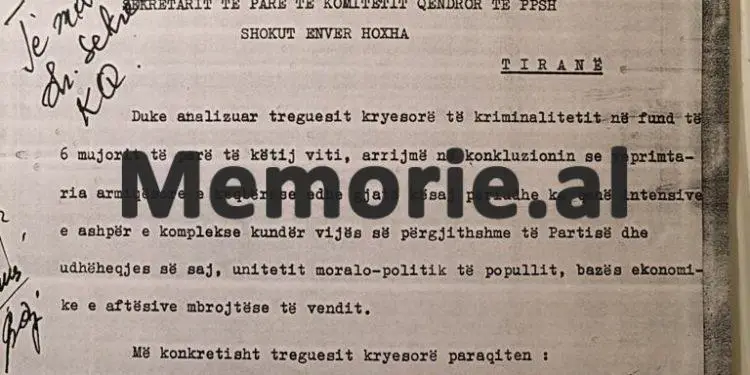Dashnor Kaloçi
Second part
Memorie.al publishes an interview with Mr. Nasi Gjika, originally from Përmeti, who after graduating from high school in the gymnasium of the city of Erseka where his family lived at the time, having a great passion for literature, competed at the Higher Institute of Arts in Tirana, but even though he won for the acting branch, he was not sent to the Arts, but to the High School of the Ministry of Internal Affairs, in Sauk, Tirana, which he completed in 1974, graduating in the Border branch and on August 9, that year, he was appointed commander of the Border Post, in the village of Mrek in Vermosh, which was considered one of the most difficult border crossings Albania had until 1990. Testimonies of former officer Nasi Gjika, regarding some of the extraordinary events that occurred in the period 1974-1982, when he served as commander of the Autonomous Border Company and later as head of Training in the Internal Branch of Shkodra. Such as the escapes to Yugoslavia of Gjeto and Kanto Vushaj in 1974, the escape of a family of five, in 1978 to a place called Livadhi Arusha, the escape of Nikol Hysaj (Gjeka), from Vermoshi, in July 1979, which managed to cross the border in a place called Gërxhare, until the killing of two young boys 22-24 years old, by the soldiers of the Tarabosh border post, over the village of Zogaj in August 1982, where one of them was the son of the Chief of Counterintelligence (Security) of the Internal Affairs Branch of Shkodra district, Pjetër Gjini. The archival document with the initials “Top secret”, of the former Minister of Internal Affairs, Feçor Shehu, sent to the Central Committee of the ALP and personally to Enver Hoxha, regarding the events that took place at the state border of Shkodra and all state border of the Socialist People’s Republic of Albania, for the period 1979-1980.
Continued from the previous issue
Mr. Gjika, then, in meetings and work analysis, you mentioned the escape of Nikol Hysaj as a negative event to aggravate you and what was said about Nikolle Hysaj by your colleagues of the Border Forces?
It was also mentioned in meetings and analyzes, but not in order to burden me, but after some time, I once asked in confidence, Ajet Zenelin, the Head of Border Counterintelligence of the area, what was said about Nikol Hysaj, that is what Nikola was doing abroad (given that the communist regime had killed his father), and he told me: “No, no, he has not been active with any treacherous reactionary organization. “Apparently he put his finger on his head and looks at his work.”
You said that there were cases when border soldiers killed people who tried to escape abroad, do you remember any case specifically?
On August 19, 1982, (shortly before I was transferred from Shkodra to the district of Tropoja), near the clone above the village of Zogaj, on Mount Tarabosh, the border forces killed two young boys (22-24 years old) , as they had attempted to cross the border and would leave for Yugoslavia, in the Montenegrin area. One of these young men, named Aleksandër Gjini and his father, Pjetër Gjini (so called if I am not mistaken and originally from Mirdita), was in charge of the Counterintelligence (Chief of Security), in the Department of Internal Affairs of Shkodra. Both of these boys, together with their families, lived in the city of Shkodra. For some time, I had fled the Border, being transferred to the Shkodra Branch of Internal Affairs, as Chief of Training. Based on this fact, since I was serving in that position, I happened to be on duty (ready) and in the early hours of midnight on August 19 (if I am not mistaken, their murder took place at 02.00 pm), I was notified that I had to leave urgently for the designated place (at the top of Tarabosh), as the Border forces had annihilated two border trespassers, who had attempted to escape from inside, outside. Upon receiving this order, I, together with officer Xhevit Kulloli (Border Commissar of the entire district of Shkodra), with a covered “Gaz” car, went straight to the scene, where we saw the two lifeless bodies of those two young boys.
What did you do to initially identify who those two boys were killed by the border guards?
We were very shocked, as soon as we went there, we learned that one of the killed was the son of the Chief of Counterintelligence (Chief of Security) in the Internal Affairs Branch of Shkodra district, Pjetër Gjini, while the other was the son of an officer, (but that his father had died some time ago), while one of his uncles, was still an army officer. According to the rules, with the exception of securing the scene, so that no one would approach there, to disrupt the evidence, we had to take no further action without the arrival of the team of experts who would inspect the scene.
When did the expert team come?
The team of experts led by the Chief of Investigation of Shkodra district, Qemal Meta, came in the morning, who according to the law did their duties, inspecting the scene, measurements, service book, weapons control, tasks given before service, report etc.
What happened after that, where did you send their troops?
After the team of experts led by the Chief of Investigation, Qemal Meta, finished his work, we were given the task that Xhevit Kullolli (Shkodra District Border Commissioner), would take their two dead bodies, with the car “Gas” and we would send them to the Department of Internal Affairs, from where other procedures would continue according to applicable laws, in the morgue, etc. So, after being loaded in the covered body of “Gazi”, the two dead bodies of those unfortunates, we left for the destination and before going to Shkodra, we stopped at the restaurant of Shiroka, to drink a coffee, more to gather ourselves, that we were shocked about this event, that one of those boys, namely Aleksandër Gjini, was the son of our Branch colleague, Chief of Counterintelligence, Pjetër Gjisni.
While Commissar Xheviti and I were drinking coffee, many people approached the covered car guarded by some soldiers. Meanwhile, someone opened the back pile of “Gazi” (for which I still have a mystery, who opened it), and all the people who were there, saw the two dead bodies of young boys, killed by border guards. At that moment, a woman who was near the spond, when she saw the two lifeless bodies fainted and they barely mentioned her after a few minutes.
Then, meetings and analyzes were held and how was that event considered?
Certainly, meetings were held and for what had happened, the staff of the Tarabosh Border Post, where the event took place, were praised and commended for praiseworthy work, giving speeches and honors, with the motivation to increase vigilance, etc. , or rewards with extraordinary permission, as was done at the time.
Were any of them decorated, as was not uncommon at the time?
The border soldier who killed those two young boys was decorated by the Presidium of the People’s Assembly, if I am not mistaken with the “Medal of Bravery”.
Where was that soldier from?
From Frashëri i Përmetit.
The bodies of the two killed, given to their families afterwards?
As far as I know, they did not give you. This was not done at that time, that is, all those who were killed at the border, nor was it a matter of giving their bodies to families. So it was with them, they did not give it to the families.
What happened to Aleksandër Gjini’s father, the Chief of Counterintelligence in the Shkodra district, who fired him?
Pjetër Gjini was dismissed from office by day order by the Minister of Internal Affairs, Hekuran Isai, that morning, before we arrived at the Branch of Internal Affairs.
Mr. Gjika, thank you for the interview and for agreeing to comment on Memorie.al.
Thank you.
The ‘Top Secret’ document with the report-information of the Minister of Internal Affairs, Feçor Shehu, sent to the First Secretary of the Central Committee of the ALP, Enver Hoxha, on August 29, 1980
PEOPLE’S SOCIALIST REPUBLIC OF ALBANIA
MINISTRY OF INTERNAL AFFAIRS
FIRST SECRET DIRECTORATE
No. 3436 Examples No. 1
Tirana, on August 29, 1980
SUBJECT: On some issues of hostile and malicious activity during the months of July, August and negative events in the staff of the Ministry of Internal Affairs
FIRST SECRETARY OF THE CENTRAL COMMITTEE OF ALP
COMRADE ENVER HOXHA
T I R A N Ë
I N F O R M A T I O N
ON THE ESCAPES FROM JANUARY TO JULY 1980
From January to July 1980, 12 people escaped through the state land border: and throughout 1979, 21 escaped. The fugitives belong to: 6 Shkodra, 3 Korça, from one Erseka and Tropoja and one district of Berat.
From the materials and problems in the follow-up, as well as from the analysis made after these events, it is clear that:
Considering the fact that during one month in the district of Shkodra there were three escapes with six people, or 50% of those who realized this during the seven months at the national level, we closely followed the analysis made by the Bureau of the Committee of District party. From this meeting it was concluded that in this district for escapes, several causes have influenced:
Communists and special cadres of the Shkodra Branch of Internal Affairs, starting from the fact that in recent months there had been no escape, instead of taking the necessary measures to increase vigilance against people with such tendencies, began to say that: ‘ this year we are better, we have fewer events, the service has been revolutionized, the staff and the staff are tense ‘, when exactly in this period of last year, there have been escapes in this district, such as, for example, the most flagrant case of the enemy element Nikoll Hysaj (Gjeka) from Vermoshi, who was able to escape even though he had been under the surveillance of our Security and Border bodies for a long time.
For this reason and for lack of sense of responsibility, the Branch President, the secretary of the Party Committee and the Chief of Police, at this time went with permission. The clothes of a person who escaped to the Reç border crossing sector were found by the border service after 8 days.
Security and Border did not appreciate the fact that these special enemy elements are using directions not closed with the electro-signal barrier system. The Security Agency did not cover the geological expedition, which operates in the Vermosh area, with signaling force.
Cases of lack of mutual information between the staff of the Branch and those in the field, about the changes that occur in the area and certain individuals continue.
In the border ward, these 7 months there have been over 30 negative cases in service, which testifies to the underestimation of enemy activity and reduced vigilance in duty.
The sectors of the Internal Affairs Branch have made concessions in the implementation of the norms that determine the orders for the border regime.
After the events, from the controls exercised, in the area of Vermoshi were found 14 children and some families of employees, who had neither a residential nor a work center. Some popular councils, not only do not apply certain criteria, but in some cases abuse their right to grant permission to persons seeking to enter border areas.
The chairman of the People’s Council of the village of Tamara had given permission at the border line to four people from a family with poor political composition and those who had fled abroad.
During 1980, in some border areas there were extensive active personnel with the staff of the problem of vigilance and strengthening the border regime, but exactly this year, out of 189 violators of the regime, the people of this district captured only 18 of them, so less than the same period last year. This shows that in what is said in these assets, they do not fit properly into the masses of the people.
The secretary of the party organization of the Factory “Drini”, where two young people who escaped had worked, instead of analyzing the work and responsibility of the party organization in this case, went so far as to say:
“The responsibility for this lies with the Executive Committee that sent such people to work.” Thus, the Director of the Geological Enterprise and the Director of Reclamation dismissed their responsibilities for cases of this nature.
Hence the conclusion that the Party organization and the Branch Party Committee, as well as the district Party Committee, have not been able to create that strain and spirit of mobilization and that vigilance and readiness that require the present situation.
Therefore at the meeting of the Bureau of the District Party Committee, emphasis was placed especially on some issues of education, management, organization, control, accountability and deepening the fight against liberalism. The above, in addition to the measures determined by the Bureau of the District Party Committee. Memorie.al
GROUP OF INSTRUCTORS FOR BODIES E
INTERNAL AFFAIRS
Minister of Internal Affairs
Feçor Shehu




